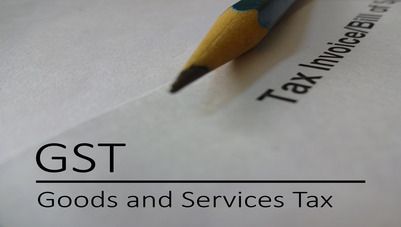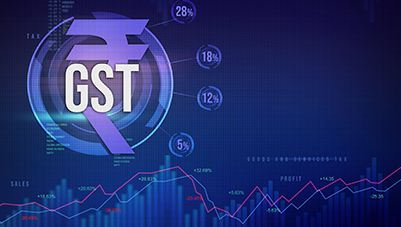Types of GST in India: IGST, SGST, CGST & UGST. Learn what they are and which taxes they replaced under the GST regime
Types of GST in India: IGST, SGST, CGST & UGST. Learn what they are and which taxes they replaced under the GST regime
India has four types of GST: Integrated Goods and Services Tax (IGST), State Goods and Services Tax (SGST), Central Goods and Services Tax (CGST), and Union Territory Goods and Services Tax (UTGST). This simple division makes it easy to tell the difference between interstate and intrastate goods. It also reduces indirect taxes. Read about these three kinds of GST to find out more.
There are 4 GST types in India:
Make your supply chain even more efficient. Keep your working capital reserves filled with a collateral-free Bajaj Finserv Business Loan. You can boost your supply chain efficiencies today when you check your pre-approved loan offer.
Additional read: E-Way Bill.
Type of GST |
Full Form |
Levied By |
Applicability |
Input Tax Credit (ITC) Availability |
CGST |
Central Goods and Services Tax |
Central Government |
On intra-state supply of goods and services |
ITC can be claimed against CGST and IGST liabilities |
SGST |
State Goods and Services Tax |
State Government |
On intra-state supply of goods and services |
ITC can be claimed against SGST and IGST liabilities |
UTGST |
Union Territory Goods and Services Tax |
Union Territory Administration |
On intra-union territory supply of goods and services |
ITC can be claimed against UTGST and IGST liabilities |
IGST |
Integrated Goods and Services Tax |
Central Government |
On inter-state supply of goods and services, and imports |
ITC can be claimed against IGST, CGST, and SGST/UTGST liabilities |
GST was implemented with the aim of achieving “One Nation, One Tax” to simplify the complexities of multiple registrations for various indirect taxes. As a result, GST consolidated several Central and State indirect taxes, including:
Central Taxes |
State Taxes |
● Central excise duty |
● Purchase tax |
● Central sales tax |
● Entry Tax |
● Service tax |
● VAT |
● Additional duties of customs |
● Surcharge and Cess |
● Additional duties of excise |
● Taxes on lottery, gambling and betting |
● Excise duty levied under the textile products |
● Taxes on advertisements |
|
● Luxury Tax |
|
● Entertainment Tax |
The main types of GST are determined based on the nature of the transaction, and include:
Scenario |
New GST Rate |
GST Calculation |
Total Amount |
SGST |
CGST |
IGST |
Tax Distribution |
A vendor in Karnataka sells goods worth Rs. 30,000 to a customer in Karnataka. |
18% |
18% of Rs. 30,000 = Rs. 5,400 |
Rs. 35,400 |
Rs. 2,700 |
Rs. 2,700 |
– |
Rs. 2,700 SGST goes to the Karnataka Government, and Rs. 2,700 CGST goes to the Central Government. |
A vendor in Karnataka sells goods worth Rs. 30,000 to a customer in Gujarat. |
18% |
18% of Rs. 30,000 = Rs. 5,400 |
Rs. 35,400 |
– |
– |
Rs. 5,400 |
Rs. 5,400 IGST is collected by the Central Government. |
A supplier in Gujarat sells goods worth Rs. 25,000 to a buyer in Maharashtra. |
18% |
18% of Rs. 25,000 = Rs. 4,500 |
Rs. 29,500 |
– |
– |
Rs. 4,500 |
Rs. 4,500 IGST is collected by the Central Government. |
The following categories of individuals are responsible for paying GST:
Understanding how CGST, SGST, IGST, and UTGST function helps businesses manage taxes efficiently and remain compliant. To support cash flow or business growth, you can check the latest business loan interest rates and use a business loan eligibility calculator to identify the right loan that meets your financial requirements and keeps your operations running smoothly.
1. Bajaj Finance Limited (“BFL”) is a Non-Banking Finance Company (BAJAJ FINANCE) and Prepaid Payment Instrument Issuer offering financial services viz., loans, deposits, Bajaj Pay Wallet, Bajaj Pay UPI, bill payments and third-party wealth management products. The details mentioned in the respective product/ service document shall prevail in case of any inconsistency with respect to the information referring to BFL products and services on this page.
2. All other information, such as, the images, facts, statistics etc. (“information”) that are in addition to the details mentioned in the BFL’s product/ service document and which are being displayed on this page only depicts the summary of the information sourced from the public domain. The said information is neither owned by BFL nor it is to the exclusive knowledge of BFL. There may be inadvertent inaccuracies or typographical errors or delays in updating the said information. Hence, users are advised to independently exercise diligence by verifying complete information, including by consulting experts, if any. Users shall be the sole owner of the decision taken, if any, about suitability of the same.
The 3 types of GST registration are Regular, Composition, and Casual. Regular registration is for businesses that carry out regular activities and have a turnover exceeding the threshold limit. Composition registration is for businesses with turnover below the threshold limit and wish to pay tax at a fixed rate. Casual registration is for individuals/businesses that occasionally carry out transactions in a state or union territory where they do not have a permanent place of business.
GST (Goods and Services Tax) is a comprehensive indirect tax levied on the manufacture, sale, and consumption of goods and services in India. Some of its key features include a single tax system, input tax credit, multiple tax rates based on the nature of the item, and implementation of a one-nation-one-tax system.
IGST stands for Integrated Goods and Services Tax. It is a type of tax levied by the central government on inter-state transactions of goods and services in India. The IGST is collected by the central government and is then distributed to the state governments in proportion to their share of the total GST collections.
India has four types of GST:

What is GST Return? Who should file, Types, Return Due Dates and Step to File GST Returns Online
Read More

E-Invoicing Under GST: Meaning, Benefits, Compliance Requirements, Components and Process
Read More

What is Input tax credit (ITC)
Read More

GST ACT | Goods and Service Tax Act - 2025
Read more
Trusted by 50 million+ customers in India, Bajaj Finserv App is a one-stop solution for all your financial needs and goals.
You can use the Bajaj Finserv App to:
Download the Bajaj Finserv App today and experience the convenience of managing your finances on one app.